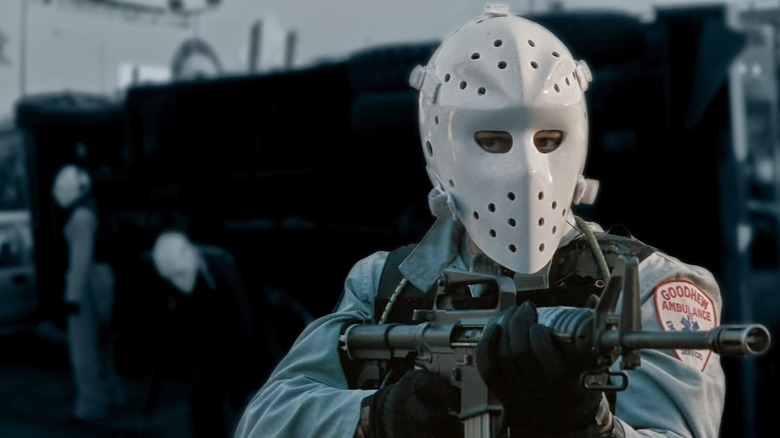The New 'Heat' Blu-Ray Is A Reminder That Michael Mann's 1995 Thriller Is A Masterpiece
We may receive a commission on purchases made from links.
Released in 1995, Michael Mann's Heat has spent the past 22 years embedding itself into pop culture consciousness. It's hard to think of a crime movie (or even a crime video game) made in the past two decades that doesn't owe it some kind of debt. This is Mann at his biggest and glossiest, his coolest and his grimmest, his most realistic and his most fantastical. It's the three-hour action epic of our dreams.
With the new "Director's Definitive Edition" Blu-ray on sale this week, Jacob Hall and Jack Giroux sat down to talk about Heat, what makes a Michael Mann movie, and yes, that rightfully famous shootout.
A History With Heat
Jacob: Okay, so I want to get things rolling by talking about the first time you saw this movie. I was a little too young to catch it in theaters, so I first saw it on DVD in the mid-2000s. Even by then, it was clear how many other movies were borrowing from it and stealing from it. More than any other Michael Mann movie, it's left a huge fingerprint on popular movies. Did you see it before its larger impact was felt?Jack: I saw it for the first time around the same time you did, so it was already considered a modern classic. I do remember at the time I first watched it, maybe only seven or eight years after its release, that the title already carried a lot of weight. I remember just looking at the DVD cover, seeing the title and the names above it, and knowing I had to watch it immediately. Even the cover art just promised a major event.Jacob: It makes me wonder how many younger people will watch it today and not realize how many cliches it created and how many foundations it established. I mean, how many people who saw The Dark Knight realize Christopher Nolan's debt to Michael Mann? How many video gamers realize that the bank heist scene is directly responsible for so many shooters? It's a testament to the film's power that it's still so good even though everyone has tried to wring it dry. That's Casablanca-level resilience.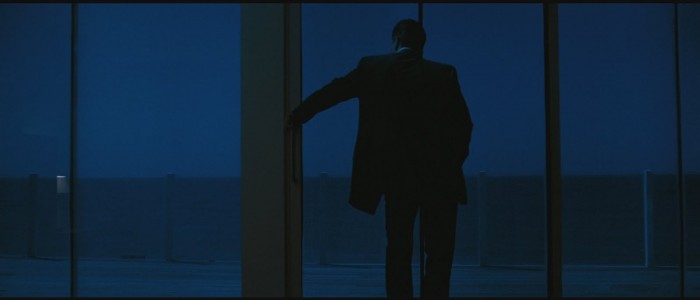
What Defines a Michael Mann Movie?
Jacob: Before we start narrowing in on the details, I want to talk about what defines Michael Mann as a filmmaker. Whenever you watch his movies, you're clearly watching a Michael Mann movie. What stands out to you, especially after revisiting Heat?Jack: What's not being said. I don't think Michael Mann has characters say something he can't visualize for the audience. There's no wasted words. His protagonists are typically very succinct, in their choices and action. I think Michael Mann also has tremendous empathy for his characters, in Heat and his other crime films, partially because he's a great observer of behavior. He never tells us how to feel about Neil McCauley or most of his characters. He presents what they do and how they do it. He's always showing, not telling.Jacob: For sure. And while many people focus on the realism in his movies (and rightfully so, because the attention to detail can be extraordinary), I think it's what's unreal that really defines him. There's a sense of melodrama to his work that I find hypnotic. Even as his characters act like real-world professionals, they speak like they're in a novel or play. There's a heightened style to their dialogue and a sense of high drama to the character relationships. Heat sometimes feels like Douglas Sirk with machine guns. I wonder if Mann will admit to this, but there's a soap operatic quality to his storytelling and I find that enthralling. It's Big Drama, even when everyone on screen says so little.Jack: I think you see that whenever Eady and Neil are together. There's something almost unworldly and dreamlike about how Mann shoots them. She'll radiate intense light, while he'll project darkness. As grounded as the movie is, even simple exchanges have that operatic quality you're talking about.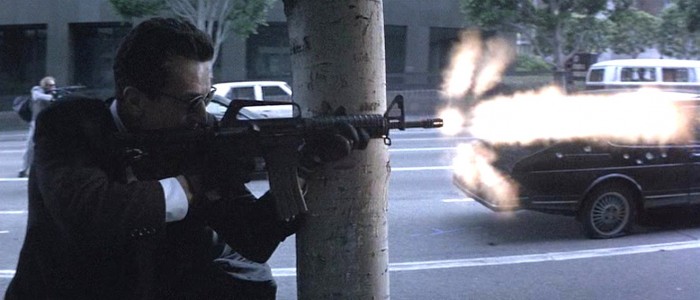
A Cast of Killers
Jacob: We'll eventually have to talk about that big shootout, but I'm inspired by something you sent over in your notes. In the first heist, we watch Waingro kill a security guard in cold blood, but then the other members of the team execute the other two. It's presented as a pragmatic decision – with one murder already on their hands, they might as well ensure there aren't any witnesses. From the first scene, Heat is telling us that these are bad guys and then daring us to like them anyway and want them to escape. I feel like the opposite can be said for Al Pacino's character, who is the "good guy" despite often coming off like a lunatic.Jack: Pacino has the most destructive personality of all the leads in the movie, despite being the "good guy." It's funny, you saying he's a lunatic, because watching it again and knowing the character had a cocaine addiction removed from the film, you can guess when and where the character is probably hopped up on coke. Whenever he goes big – and I think Pacino is one of the few who can stay human while going this big – it's funny, for one thing, but I think it also shows what intense pressure the character is under. He deals with life and death stakes every day. He acts a little different because he is different. He sees the world in a way Justine and others do not. Going about another bad day with a sense of humor keeps him sane, I imagine. As insane as he acts or looks, he's probably the most sane character in the movie, though. One thing I hadn't thought before is how funny Heat can be. Michael Mann's movies aren't humorless, but they're usually not as funny as this one. Most of the laughs come from Pacino. The scene where he takes the television and kicks it out of his car is a scene you're expect from a broad comedy, not an epic crime drama.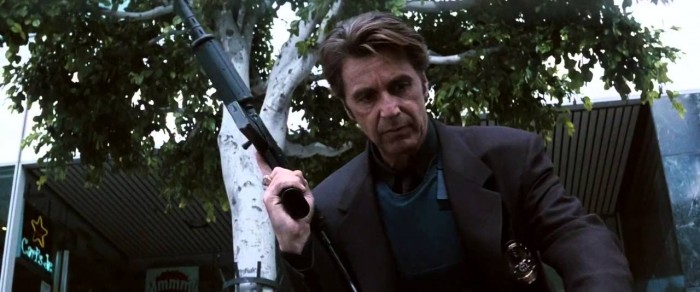 Jacob: I think De Niro acts as a great contrast to Pacino here. He's a killer, but he's soft spoken and smart and seems to think about each and every word that comes out of his mouth. He's as composed as Pacino is unhinged. De Niro is infamous for his extensive character preparation and I feel like it pays off here. Everything about this guy feels carefully considered. He feels totally complete even as he remains an enigma. Watching him here, I can't help but imagine the alternate reality where De Niro pulled a Liam Neeson and started contributing his chops to more straightforward action movies. In fact, this may be one of his last great performances. He's only a few years away from stepping into his self-parody phase.Jack: I think he's done a lot of great work post-Heat – Wag the Dog, Ronin, Analyze This, and Meet the Parents – but he feels incredibly in-control of his performance here, with what he does or doesn't show us about the character. Like with Mann's filmmaking, his silences speak volumes.
Jacob: I think De Niro acts as a great contrast to Pacino here. He's a killer, but he's soft spoken and smart and seems to think about each and every word that comes out of his mouth. He's as composed as Pacino is unhinged. De Niro is infamous for his extensive character preparation and I feel like it pays off here. Everything about this guy feels carefully considered. He feels totally complete even as he remains an enigma. Watching him here, I can't help but imagine the alternate reality where De Niro pulled a Liam Neeson and started contributing his chops to more straightforward action movies. In fact, this may be one of his last great performances. He's only a few years away from stepping into his self-parody phase.Jack: I think he's done a lot of great work post-Heat – Wag the Dog, Ronin, Analyze This, and Meet the Parents – but he feels incredibly in-control of his performance here, with what he does or doesn't show us about the character. Like with Mann's filmmaking, his silences speak volumes.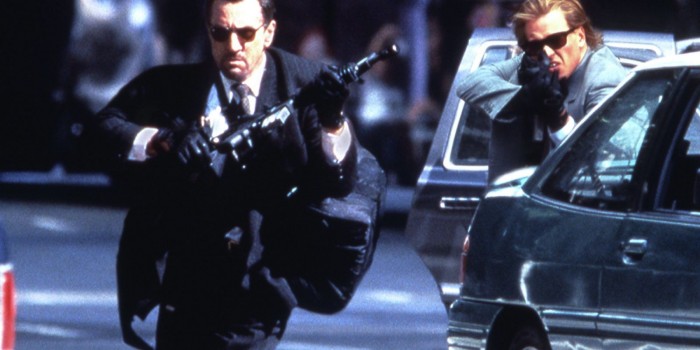
That Big Gun Battle
Jacob: You told me a little while back that you wrote a paper in college about the realism in Heat. I know that the big bank robbery shootout is used as a training tool for U.S. soldiers now and that the gunfire was all recorded live, instead of added in post. I've never been unfortunate enough to be in a gunfight, but this movie certainly looks and sounds more real than most, and therefore, it's more terrifying. It's rare for action scenes to be, well, scary.Jack: I wish my memory was better than it was, because I don't remember as much as I'd like to about that criminology paper (besides it probably being very pretentious). I remember thinking he was very faithful to that lifestyle, speaking of both the cops and crooks.Jacob: Let's talk about that shootout, because it's rightfully famous. It has that awful, stomach-churning effect where you don't want either side to hurt the other. You've gotten to know each of them so well. It's almost a shock when Tom Sizemore uses that little girl as a human shield. You've forgotten that these guys are ice cold.Jack: Your stomach churns seeing Val Kilmer get shot almost as much as it does when Ted Levine's character is killed. It's messy, chaotic, and loud as hell. Death is so present, too. Mann doesn't ever have a news anchor say what the body count is, but you feel every death in that scene, every cop that goes down. And when Pacino takes Sizemore down, you can finally exhale.Jacob: I don't always have the ear for sound mixes, but this new Blu-ray gave my sound system quite the workout. My entire living room was shaking, but I feel like that's the only way to watch this movie. Turning it down would be crime. The volume of it immerses you into the scene as much as Mann's camera does. And speaking of his camera, what it does here is quietly remarkable. Much of the scene is shot in close-ups and medium shots, but when he does go long, there tends to be a specific purpose: to present distinct point of view, to showcase an out-of-place element, to relay the geography of a scene to the audience. You're never lost in the chaos. You're really thrown into this hell.Jack: Those long shots in his action always blow me away, like when Kilmer is on the roof firing off rounds from a distance while De Niro is in the car. There's always a sense of where all the players are in relation to one another.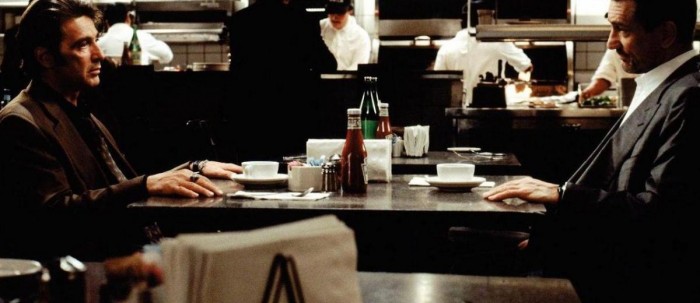
A Los Angeles Movie
Jacob: Jack, as someone who lies in Los Angeles, what do you think of Mann's depiction of the city? Is this a great L.A. movie? What do you think of his depiction of the city?Jack: Mann captures the sprawl of the city. There's many shots, including those spectacular aerial shots and the scenes with Neil and Eady on the balcony, where the city looks and feels never-ending. He captures the nighttime sky – the deep blues, purples, and smog – better than most. L.A. has a distinct atmosphere, sometimes that feels both real and fantastical, and Mann nails that mood. The vastness of the city makes Vincent and Neil, in some ways, feel more alone.
***

